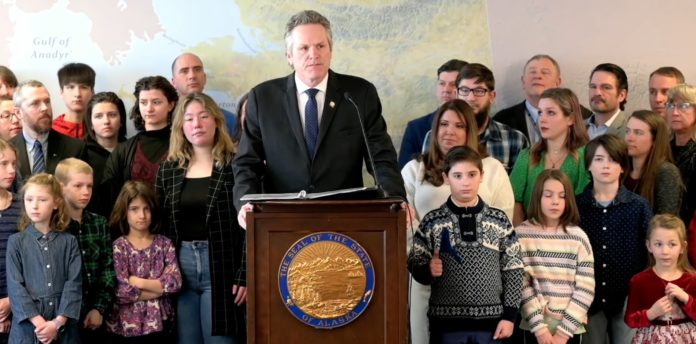By JON FAULKNER
Gov. Mike Dunleavy’s threatened veto of the current education bill,, SB 140 is precisely the response Alaska needs to awaken a Legislature that is out of step with Alaskans and wholly unresponsive to the modern crisis of non-education.
Education is the greatest equalizer known to mankind. It elevates people of every race, socio-economic status and creed like no other force in history. How did this egalitarian force of such immense power become so tainted by politics?
Education is compromised in the same way our freedom itself is undermined: through the slow erosion of our freedom to choose. This is the root cause of the decline in K-12 public education everywhere. Those who seek to monopolize and control K-12 education by restricting our choices, while at the same time promoting increased funding designed to perpetuate their control, are the problem. Conversely, those who seek to expand educational options are the solution.
There are endless examples of how expanded choice in education is succeeding everywhere. Charter schools are flourishing nationwide. Florida and other states have implemented transportable education credits that respect an individual’s right to choose among alternative schools. Platforms for advanced learning abound.
The subject of educational reform lacks precisely what is missing from education altogether: an unceasing quest for knowledge and truth. Our Legislature ignores approaches with proven track records and instead chooses to increase funding for NEA- and union-backed solutions, which carry zero accountability for improved outcomes, all under the guise of supporting students.
Ask your legislator to identify the root causes of our low nationwide standing in basic proficiency. Too often what we hear reveals a self-serving lack of interest in facing the truth.
The problem is a system monopolized by a single government agency that is increasingly estranged from – and distrustful of – the parents charged with raising these same K-12 children. The solution is expanding local options within a publicly managed system that encourages competition for improved outcomes, benefiting youth, parents, and taxpayers.
Improved outcomes in education will only come from expanding our ability to choose – just as it has throughout history in virtually every field of human endeavor. Increasingly, Alaskans feel they are being forced to fund an enterprise that is failing their children, that is insensitive to parental values, and that rejects accountability.
If increased compensation for teachers is needed, why is Governor Dunleavy’s bonus initiative that is targeted at the most critical need – recruitment of rural educators – rejected? Efforts to streamline administration, to privatize maintenance, or downsize our schools to re-direct money to teachers are all within the Legislature’s purview to enact – and yet they don’t. Why?
The answer is a political one. Well-meaning candidates for office adopt platforms of educational reform to win elections, and yet the tactics employed by unions to kill real progress are effective. Alaska’s two-term governor was elected to challenge this impasse. Yet every year, the Legislature foils the governor’s agenda. Every cycle, voters send Republican majorities to Juneau, only to witness coalitions forming around defending the educational status quo and calls for greater funding. Some high-profile legislative leaders who claim the Republican party label in practice have little in common with their party leader (Gov. Dunleavy) and their party’s education platform.
Increasingly, parents are fed up with low proficiency in basic academic fields, absenteeism and low graduation rates, erosion of cultural autonomy and values, and fewer students aspiring to higher academic pursuits.
The left argues so many points in opposition to school choice that it’s hard to track them all: that school choice victimizes the poor and “special needs” youth, that it syphons resources from public schools, and that charter schools steal role models from peers who learn better when they have someone to admire or emulate.
These arguments protect a broken sinkhole of spending, which keeps going up while enrollment and results decline. The inconvenient truth for the Left is that more money is being spent per pupil now than ever, but with little progress to show for it.
Anti-choice arguments do nothing to break the historic downward trends in outcome. Schools were never charged with replacing parents. Expanding the view of public education as having a broader mandate than pure learning is merely a tactic to increase budgets. School administrators who complain about lack of funding are the first to expand the mission of education beyond its core public mandate.
Competition among educational options is not the problem, but rather the solution. Competition produces improved outcomes in virtually every field of human endeavor and evidence abounds that it works in education. Today’s students, from our inner-city poor to the suburban privileged, all thrive in an atmosphere where public funding is managed by the individual in a manner that supports their self-interest, within a system where competition and choice are ever-present.
Public schools are suffering from revenue declines due to reductions in enrollment, and it will continue. If we continue down the path of NEA-controlled curriculum, partisan rancor will spoil education and ruin opportunities for our youth for years. Taxpayers will be forced to pay increased costs for a system they do not benefit from. Our schools own this outcome, after years of failing in their basic mission.
Freedom, ultimately, is humanity’s most equalizing concept, one uniquely enshrined in our institutions and the American dream. Core to our understanding of liberty is the freedom to choose among options afforded to us, which right is based on an abiding respect for each individual’s dignity, privacy, and aspirations. It is time to exercise our freedom and our ability to choose how we educate our youth.
Jon Faulkner is the president of Alaska Gold Communications, parent company to Must Read Alaska.
